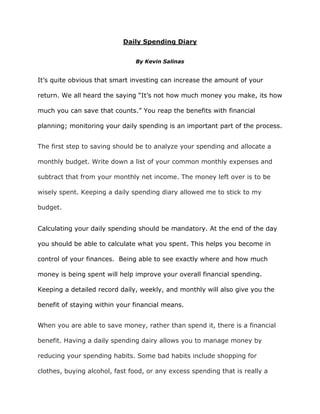
Daily spending diary
- 1. Daily Spending Diary By Kevin Salinas It’s quite obvious that smart investing can increase the amount of your return. We all heard the saying “It’s not how much money you make, its how much you can save that counts.” You reap the benefits with financial planning; monitoring your daily spending is an important part of the process. The first step to saving should be to analyze your spending and allocate a monthly budget. Write down a list of your common monthly expenses and subtract that from your monthly net income. The money left over is to be wisely spent. Keeping a daily spending diary allowed me to stick to my budget. Calculating your daily spending should be mandatory. At the end of the day you should be able to calculate what you spent. This helps you become in control of your finances. Being able to see exactly where and how much money is being spent will help improve your overall financial spending. Keeping a detailed record daily, weekly, and monthly will also give you the benefit of staying within your financial means. When you are able to save money, rather than spend it, there is a financial benefit. Having a daily spending dairy allows you to manage money by reducing your spending habits. Some bad habits include shopping for clothes, buying alcohol, fast food, or any excess spending that is really a
- 2. “could do without.” Being able to turn a bad spending habit into to a beneficial savings can increase your finances and outlook towards life. If you have any liabilities you should pay more than the minimum payment and pay them off as quickly as possible. Any credit card debt should also be quickly paid off so that you are able to save on any interest charges. The long term benefits of reducing extra spending and eliminating debt is incomparable. Life is less stressful without the financial burden of owing money. Everyone has an urge to spend money so it’s important that we control our spending in order to live within our means. To do so keep track of the things you have. It’s also important to have an itemized list of your possessions and for insurance purposes. By doing this you can avoid buying things that you already own. Temptation can be difficult to resist but you should really question yourself every time you are about to buy something. Think about if the item is a need or want? The chances are, most likely you can do without. Minimize your spending with substitutions. If gas prices are costly seek public transportation. Instead of eating out, buy groceries for the week. There are several ways to save money. Another way is by planning free activities such as going to the park or visiting family. Avoid using credit cards and only carry small amounts of cash to avoid over spending. All of these tips will improve your financial situation.
- 3. The economy changes with time. Interest rates are subject to change without consent. Being able to be financially secure during and for these unpredictable situations is something everyone should consider. If interest rates begin to increase and inflation causes the cost of goods to rise, many households may struggle without financial planning.